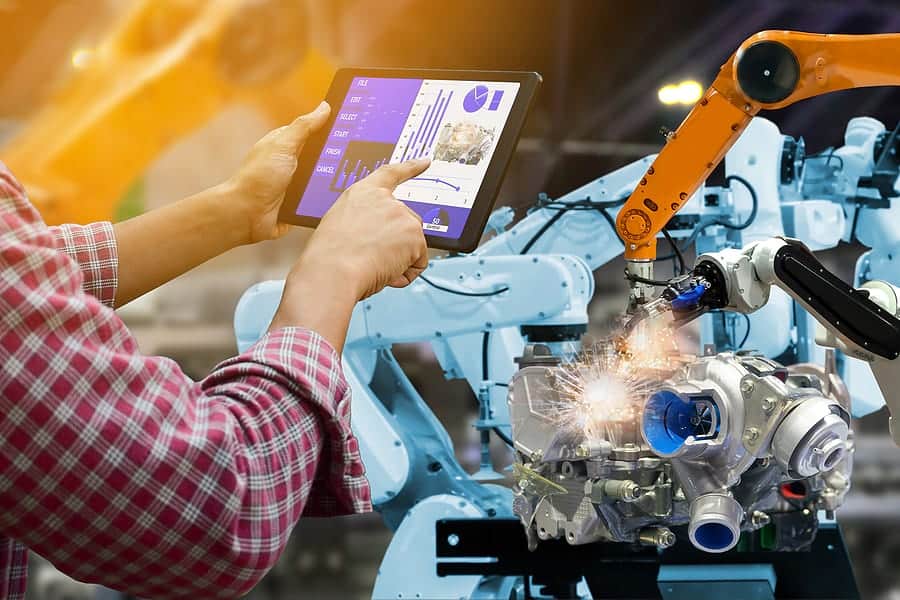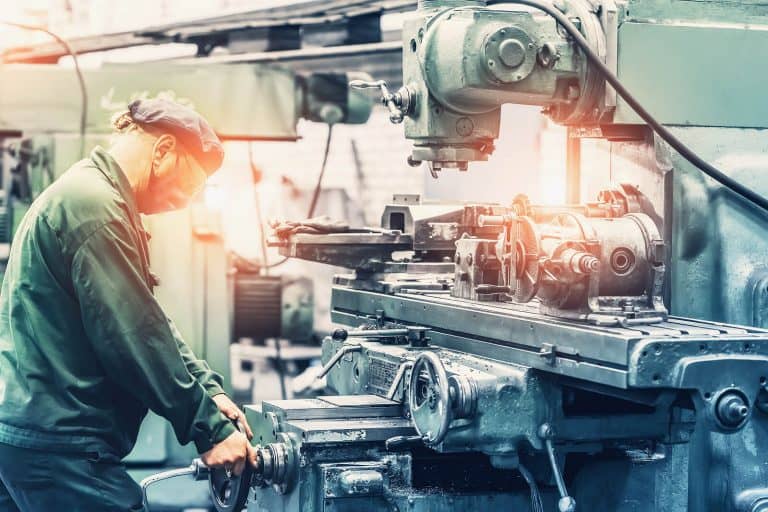What Industries use Manufacturing Technology? It’s a good question. Read on!
Table of Contents
ToggleWith the ongoing shift from a reliance on manual labor to automation, the use of technology in industry is gathering pace. It’s also extending into a diverse range of verticals. In this article, we’ll be looking at how manufacturing technology is changing both production and management methods — not only in the manufacturing sector but also in a wider context.
What Kinds of Manufacturing Technology are Available?
Broadly speaking, manufacturing technology provides the tools that enable the production of all manufactured goods. This can range from the simplest hand tools to sophisticated digital systems incorporating robotics and artificial intelligence.
Even in the digital age, much of the technology used in manufacturing still has a mechanical or motor-driven basis. This would include tools like presses, stamps, and equipment for the cold or hot forming of various materials. Material handling equipment such as conveyors, pallet changers, and bar feeds routinely operate in tandem with more advanced mechanisms such as robots.
With the introduction of favorable policies towards the manufacturing sector in many countries and an increased focus on economic diversification in emerging markets, industrial automation has been gaining ground in the deployment of manufacturing technology. Here, intelligent machines are employed in factories and warehouses to carry out manufacturing and other processes with minimal human intervention. They routinely perform tasks that require endurance, speed, and precision — often in conditions that would be unfavorable to humans.
Among the key automation technologies used in manufacturing are:
The Industrial Internet of Things (IIoT)
Smart connected devices for industry can capture and analyze data in real-time, giving organizations the insight they need to optimize their operations and make better business decisions. IIoT implementations enable manufacturers to perform predictive maintenance, asset tracking, supply chain management, improved field service, and enhanced product delivery to consumers. Besides providing greater traceability for supply chain operations, IIoT applications in manufacturing can also deliver better quality control, sustainable and green production practices, and improved operating efficiency.
Robotics
Industrial robots have been contributing to the manufacturing sector for decades. The prevailing trends for manufacturing automation or “Industry 4.0” are the use of collaborative robots or “cobots” and total automation in the shape of “lights-out” manufacturing.
Collaborative robots tend to manifest as smaller and more agile units capable of working alongside humans. They are typically deployed in tasks that are repetitive, jobs that involve heavy lifting or a degree of precision that humans aren’t capable of, or in environments that might prove hazardous to human health and safety.
“Lights-out” manufacturing facilities are fully automated and staffed entirely by robots. This means that the production space does not require the levels of lighting or ventilation that would be necessary for human habitation — the “lights out” factor. Operations in such facilities may extend round the clock for weeks or months at a time.
Artificial Intelligence
Sophisticated artificial intelligence (AI) and machine learning (ML) algorithms are enabling manufacturers to process and analyze big data — for example, in identifying patterns that link geographical location, weather, consumer behavior, political, socioeconomic, and macroeconomic factors, to enable organizations to anticipate changes in market conditions, and to optimize manufacturing supply chains. AI algorithms are also the foundation for the analytics that enable predictive and preventative maintenance.
Advanced Materials and Additive Manufacturing
Using new consumable materials, additive manufacturing, or 3D printing processes enables manufacturers to produce components and finished products at all scales — from test models and rapid prototypes to large and complex structures like housing. As long as the object can be built up in layers, 3D printing is virtually limitless in scope. Some of the newer substances like the nano modifier 3D printing materials solve some of the problems associated with earlier forms of the technology, such as limiting physical properties and limited applications.
Cloud ERP (Enterprise Resource Planning)
Traditional software deployments for Enterprise Resource Planning (ERP) were too complex and expensive for smaller-scale businesses to take on board. However, with Software as a Service (SaaS) offerings in the cloud, ERP has become more affordable, in addition to being quicker to implement and easier to manage and maintain. For manufacturers, cloud ERP solutions provide significantly improved levels of insight into operations without the expenses associated with on-site maintenance, hardware, and security.
Uses of Technology in Industry
Manufacturing technology is a critical component in the day to day operations and success of organizations across a range of verticals. So what industries use manufacturing technology? Here are the most common:
Construction and Fabrication
As we’ve seen, new materials and additive manufacturing technologies are enabling the construction and fabrication of component parts and complete, finished products. New methodologies such as the high-speed sintering technique developed by Neil Hopkinson of the University of Sheffield are making it possible for industrial inkjet heads to deliver materials, which are then fused together with an infrared lamp — a process up to 100 times faster than prevailing 3D printing techniques for plastics.
Smart factory technologies are integrating digital, connectivity, and analytics into every part of the manufacturing process. The fusion of technologies like artificial intelligence, the Internet of Things (IoT), virtual reality, and augmented reality are enabling decreased labor costs, increased efficiency, and reduced waste. Analytics are also enhancing quality control standards, enabling manufacturers to assure their consumers of superior and reliable products.

Beyond production, ERP software enables constructors and fabricators to unify enterprise data from finance, HR, operations, inventory, and sales on a single platform. Design and project management software suites allow construction companies to manage everything from design to human resources.
What Industries use Manufacturing Technology? Energy
One of the most significant issues afflicting energy companies is the lack of reliable internet for workers who must often operate in remote or hazardous locations. For these workers, being unable to reach their contacts or gain access to needed files presents a huge obstacle to workflow efficiency.
This issue may be addressed by setting up mobile hotspots for wireless internet access. These hotspots may be established in conjunction with a cellular service provider, using dedicated routers or MiFi units.
Logistics and Transportation
For organizations in the vehicular transport and logistics arena, a platform for fleet management is a central requirement. Fleet management may comprise a range of functions, including vehicle financing, vehicle maintenance, vehicle telematics (tracking and diagnostics), driver management, speed management, fuel management, and health and safety management.
In the US, an electronic logging device (ELD) is used to electronically record a driver’s Record of Duty Status (RODS), which replaces the paper logbook that some drivers currently use to record their compliance with Hours of Service (HOS) requirements. Logging devices are now a requirement for trucks. According to provisions from the FMCSA, smartphones, tablets, and rugged handheld devices can be used for this purpose, as long as the system as a whole meets ELD requirements, including a hard-wired connection to the truck’s engine.
Manufacturing Technology in Other Sectors
What Industries use Manufacturing Technology? Technologies used in industry may also have applications in other walks of life. For example, 3D printing is being used in education and healthcare for the production of one-off components, specialist instruments, and advanced modeling. Many of these applications are being enhanced through the development of engineering simulation software, which enables designers to simulate the manufacture of a part, from its initial concepts to its final production.
In the high tech industry, an international team of researchers has recently come up with a light-based manipulation platform, which could one day be used to manufacture electronic components for smartphones and computers. The methodology relies on optical traps — devices that use light to manipulate small objects in a liquid.
Summary:
What Industries use Manufacturing Technology?
Construction and Fabrication, Logistics and Transportation






